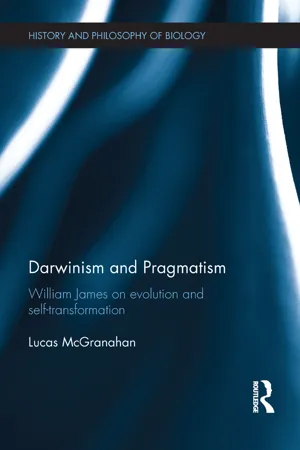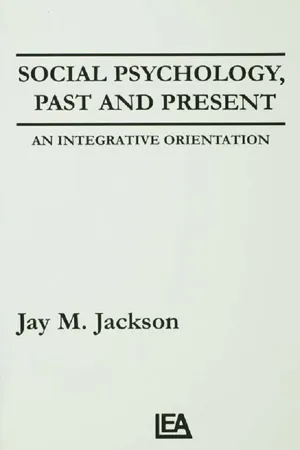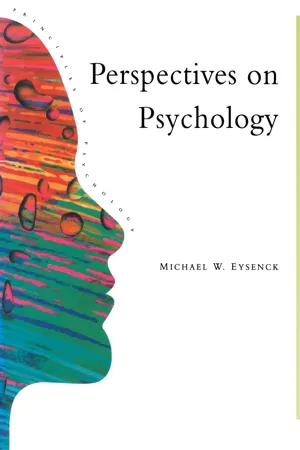Psychology
Charles Darwin
Charles Darwin was a British naturalist known for his theory of evolution by natural selection. His work revolutionized the understanding of the development of species and had a significant impact on the field of psychology. Darwin's ideas about the continuity between humans and other animals and the role of adaptation in shaping behavior have influenced the study of human behavior and cognition.
Written by Perlego with AI-assistance
Related key terms
7 Key excerpts on "Charles Darwin"
- eBook - ePub
- L.S. Hearnshaw(Author)
- 2019(Publication Date)
- Routledge(Publisher)
The science of geology was not, however, sole forerunner of evolutionary biology. It was but one of many contributory streams. Comparative anatomy, embryology, palaeontology, prehistoric archaeology, and other new disciplines, all sprouted vigorously during the early half of the nineteenth century. We tend to forget how recent was the discovery of much of the basic data of the biological sciences. The manlike apes, for example, were not scientifically described until the late eighteenth century, though the subject of travellers’ tales from 1600 onwards. It was not till 1835 that Owen, later Director of the Natural History Museum, first examined the skeleton of an adult chimpanzee. The remains of the giant reptiles were revealed to an astonished world in the 1820’s and 1830’s, and in what has been called ‘the heroic period’ of palaeontology some kind of system was gradually imposed upon the extraordinary panorama of ancient life. In Germany the researches of von Baer between 1819 and 1837 “first clearly demonstrated the great events in a life history”, and laid the foundations of embryology. His work was one of the formative influences upon Spencer, and when related to the discoveries of the palaeontologists led to the formulation of the law of recapitulation, which saw in the development of the individuai a re-enactment of the main stages in the development of the species. Finally man himself was shown to have an ‘antediluvian’ pre-history first by the discovery in 1846 of flint instruments at Abbeville in France which were unquestionably of great antiquity, and then by the discovery in 1857 of the Neanderthal skull. The theory of evolution alone could make sense of these numerous discoveries.2. Charles Darwin (1809–1882)
Charles Darwin’s reputation as a biologist is so great, and his influence on many branches of science has been so extensive, that it is easy to forget that he was in his own right a considerable psychologist. The Copernican revolution which he effected in the biological sciences was bound to have profound consequences for psychology. Darwin realized that this must be so. “In the future I see open fields for far more important researches. Psychology will be securely based on the foundations already well laid by Mr Herbert Spencer, that of the necessary acquirement of each mental power and capacity by gradation. Much light will be thrown on the origin of man and his history.”1 Less than nine years after the publication of The Origin of Species in 1859 Darwin himself began to till these fields. He notes in his diary for 4 February 1868, “began work on man”. This work led to two books, first, The Descent of Man (1871), which contained a long comparative study of the mental powers of man and the lower animals, and, in connexion with the theory of sexual selection, an account of the courtship behaviour of animals and of psychological differences between the sexes in both animals and men; and second, The Expressions of the Emotions in Man and Animals - eBook - ePub
The Biologising of Childhood
Developmental Psychology and the Darwinian Myth
- John R. Morss(Author)
- 2017(Publication Date)
- Routledge(Publisher)
2 Charles Darwin and the Origins of Developmental PsychologyThe work of Charles Darwin has been seen by many developmentalists as the single most influential source of ideas in the theory of child development.1 In this chapter, Darwin’s own views on developmental issues are investigated. These views are then set in the broader context of evolutionary thinking towards the end of the 19th century, a context in which Darwin’s theory of natural selection was only one of several competing doctrines. This context, rather than Darwin’s theory as such, was the intellectual background from which early developmental psychology emerged. The chapter includes a discussion of the impact of Darwin on his contemporary developmentalists, especially Wilhelm Preyer, George Romanes, and James Sully.THE “NATURAL HISTORY OF BABIES”: DARWIN ON CHILD DEVELOPMENTCharles Darwin (1809–1882) is widely regarded as the greatest biologist of the 19th century.2 Many of his ideas were developed on his round-the-world voyage on H.M.S. Beagle which took place between 1831 and 1836. Within two years of his return he had opened the first of a series of notebooks on issues relating to human, as well as to animal, evolution. At the end of Notebook M, which was completed in 1838, Darwin wrote the following:Natural History of Babies Do babies start (i.e., useless sudden movement of muscles) very early in life Do they wink, when anything placed before their eyes, very young, beforeexperience can have taught them to avoid danger Do they know frown when they first see it?3The notebooks covered numerous topics, including much material on emotional expression in man and animals. Darwin’s notebook material on human babies was based on secondhand evidence, but a year later his first child, William, was born. Darwin made careful observations on William’s early development, including the issues he had identified in 1838. This material remained unpublished by him until 1877, when some extracts appeared as “A biographical sketch of an infant.” 4 - eBook - ePub
- Eliot Hearst(Author)
- 2019(Publication Date)
- Routledge(Publisher)
As one reads the great philosophers from Aristotle onward, it seems as if each has issued an opinion on the question of psychological continuity and discontinuity of man and animal; in fact, major philosophical treatises have been devoted to it. Schooled as we “moderns” are to expect weighty pronouncements to be based solidly on experimental fact or, at the very least, on extensive and systematic naturalistic observation, it is a dismaying experience to search out and eventually discern the slim empirical basis of many of the older and heady tracts on comparative psychology: The ratio of speculation to evidence is just the inverse of what it is today. No wonder the French naturalist Charles Georges Leroy (1802) said that he treasured the comparative-psychological opinion of hunters more than those of philosophers because the former at least had considerable first-hand experience with the behavior of their prey, while the latter seemed largely ignorant of the functional capabilities of wild animals.In the present essay, I sketch the leading figures and ideas in the recent history of comparative psychology and ethology, beginning with Charles Darwin and his British successors (Romanes, Morgan, Hobhouse), followed by the theoretical contributions of the Canadian Wesley Mills and the Americans Baldwin and Thorndike and a brief discourse on ethological thought, and closing with a summary account of contemporary thinking and a glimpse into the future.1II. THE INFLUENCE OF Charles Darwin
The widespread scientific acceptance of Charles Darwin’s brilliant insight that evolution takes place via natural selection (among other means) is certainly attributable to the enormous data base he brought to bear on the subject in his Origin of Species, published for the first time in 1859. In fact, that treatise, which was to go through six revised editions, is the starting point of “modern” or recent comparative psychology, as well as the field of ethology. The respect for evidence (however indirect: Darwin did not describe the origin of a single species in the Origin of Species) - eBook - ePub
Darwinism and Pragmatism
William James on Evolution and Self-Transformation
- Lucas McGranahan(Author)
- 2017(Publication Date)
- Routledge(Publisher)
1 Individuals in evolution James’s Darwinian psychologyThe rise of scientific psychology coincided with the acceptance of evolutionary theories into mainstream science. Just as sensation, cognition and behaviour came to be studied as organic functions, the very concept of an organic function took on a radically historical dimension. As a result, evolutionists were now claiming that mental processes derive from a nervous system that had developed over millennia to manage the concrete exigencies of life. Mind was no longer an exalted faculty of knowledge but a set of instrumental functions tethered to an environment that had slowly ground them out.Nineteenth-century evolutionism does not speak with one voice, however. The competing mechanisms of natural selection and the inheritance of acquired characteristics, for instance, suggest different relationships between ontogeny and phylogeny – individual development and the history of species – and each mechanism has been subject to competing interpretations that emphasize different internal and environmental factors. Tracing the influence of evolutionism in psychology therefore requires attending to the specific logics of particular evolutionary theories.The present chapter does not attempt to map out this entire territory but instead traces one instructive path: that of William James. James was among the most influential psychologists in the decades following the publication of Darwin’s On the Origin of Species (1859), especially in the US. Known as the Father of American Psychology, James is credited with founding the first psychology laboratory in the US in 1875;1 teaching the first physiological psychology course in the US in the same year; supervising the country’s first PhD in psychology in 1878; and publishing the seminal text of early US psychology, The Principles of Psychology, in 1890. An examination of James’s scientific education and early writings show how he understood Darwinism to be emblematic of the uncertainty of science. James nevertheless embraced Darwin’s theory, not just in explaining mental evolution, but also in modelling individual cognition and behaviour. James thus employs selectionist logics at both phylogenetic and ontogenetic levels, making him the first double-barrelled Darwinian psychologist - eBook - ePub
Social Psychology, Past and Present
An Integrative Orientation
- Jay M. Jackson(Author)
- 2013(Publication Date)
- Psychology Press(Publisher)
social behaviorism : Influenced by Darwin, he said that mind was not a separate type of “stuff” but an activity of the organism in its efforts to survive (Mead, 1903). But he was not widely read nor understood. Watson (1930, p. 274) confessed in his autobiography: “I took courses and seminars with Mead. I didn’t understand him in the classroom, but for years Mead took a great interest in my animal experimentation, and many a Sunday he and I spent in the laboratory watching my rats and monkeys. On these comradely exhibitions and at his home I understood him.” Mead’s theory has been influential thoroughout social psychology, although often misinterpreted. We discuss it later in this chapter.Even though behaviorists were adamantly opposed to instinctual theories, they were strongly influenced by Darwin. The evolutionary assumption that behavior develops as an adaptation to the environment in the struggle for survival is a central pillar of behaviorist theories (Berkowitz, 1969). That keystone of learning theory, the Law of Effect , has been recognized as “a special case of Darwin’s Law of Natural Selection , applied to habits (social or otherwise)” (Berger & Lambert, 1968).Social Darwinism
The amorphous field of social psychology always has been concerned with social entities and processes more comprehensive than the individual person: With groups, collectivities, culture, and social change. Evolutionary theory was the impetus for the rise of Social Darwinism in many countries: The biological theory was applied to social groups instead of to organisms. Theorists disagreed on the nature of groups and on the individual’s relation to society but they all assumed essentially the same evolutionary process in social change (Sahakian 1974). Central to their credo was Darwin’s idea of the survival of the fittest, applied to societies. This provided a rationale for ordering nations and ethnic groups in terms of their power and eminence, which they believed was positively correlated with their degree of advancement on the presumed evolutionary scale. Thus, some people were the most civilized and culturally advanced, and others were retarded and undeveloped.William Graham Sumner (1906) was a social Darwinist whose concepts folkways and mores were precursors of the contemporary study of norms and normative processes. He proclaimed that patterns of social behavior that survive from experience must thereby be the fittest—consistent with his laissez-faire ideology. The massive pioneering studies of Folk Psychology - eBook - ePub
- Michael W. Eysenck(Author)
- 2013(Publication Date)
- Psychology Press(Publisher)
It is difficult to capture the essence of Aristotle's enormous contribution to psychology. Nevertheless, it can safely be said that he had a very sophisticated view of the scientific method, and of the proper relationship between experimental findings and theoretical models. The crucial significance of his contribution can be seen in this quotation from Charles Darwin, who was himself one of the most influential figures in the history of psychology: "Linnaeus and Cuvier have been my two gods, but they were mere schoolboys to old Aristotle". What is perhaps the greatest compliment to Aristotle's eminence, however, is the fact that, for almost 2000 years after his death, psychology didn't advance significantly beyond the position he had reached.The seventeenth century
For reasons that are probably best left to historians to explain, psychology (and most other sciences) went into relative decline for several centuries after the intellectual flourishing of Ancient Greece. This decline was halted and reversed by a number of outstanding scientists in the sixteenth and seventeenth centuries. In the mid-sixteenth century, Copernicus argued that the earth and the planets moved around the sun; Galileo investigated issues such as gravity and the laws governing pendulum movements; and Sir Isaac Newton revolutionised great areas of scientific knowledge.Psychology was relatively slow to respond to the exciting intellectual atmosphere of the times, perhaps because of its comparative complexity. It is especially perplexing that the seventeenth-century approach to psychology was almost totally devoid of any attempts to conduct proper experiments, in great contrast to the approach taken by scientists such as Galileo and Sir Isaac Newton. Presumably it was believed experiments would be unable to shed any real light on the mind or soul, and so were of very limited potential value.Rene Descartes (1596-1650) was the first major figure in seventeenthcentury psychology. He claimed that animals resemble machines, in that their actions are predictable from physical laws. (This mechanistic approach to animal psychology is broadly consistent with the theoretical stance adopted by the behaviourists in the early years of the twentieth century.) But only part of human behaviour could be explained in the mechanistic terms applicable to animals. Human thought and rational decision-making illustrated the workings of the soul or mind, by which Descartes basically meant consciousness. - eBook - ePub
Evolutionary Psychology
The New Science of the Mind
- David M Buss(Author)
- 2019(Publication Date)
- Routledge(Publisher)
Part 1 Foundations of Evolutionary PsychologyTwo chapters introduce the foundations of evolutionary psychology. Chapter 1 traces the scientific movements leading to evolutionary psychology. First, we describe the landmarks in the history of evolutionary theory, starting with theories of evolution developed before Charles Darwin and ending with modern formulations of evolutionary theory widely accepted in the biological sciences today. Next, we examine three common misunderstandings about evolutionary theory. Finally, we trace landmarks in the field of psychology, starting with the influence Darwin had on the psychoanalytic theories of Sigmund Freud and ending with modern formulations of cognitive psychology.Chapter 2 provides the conceptual foundations of modern evolutionary psychology and introduces the scientific tools used to test evolutionary psychological hypotheses. The first section examines theories about the origins of human nature. Then we turn to a definition of the core concept of an evolved psychological mechanism and outline the properties of these mechanisms. The middle portion of Chapter 2 describes the major methods used to test evolutionary psychological hypotheses and the sources of evidence on which these tests are based. Because the remainder of the book is organized around human adaptive problems, the end of Chapter 2 focuses on the tools evolutionary psychologists use to identify adaptive problems, starting with survival and ending with the problems of group living.Passage contains an image
Chapter 1 The Scientific Movements Leading to Evolutionary PsychologyLearning Objectives After studying this chapter, the reader will be able to:- Identify the three essential ingredients of natural selection.
- Define particulate inheritance.
- List three common misunderstandings about evolutionary theory.
- Identify when Neanderthals went extinct.
- Explain why radical behaviorism went into scientific decline.
In the distant future I see open fields for more important researches. Psychology will be based on a new foundation, that of the necessary acquirement of each mental power and capacity by gradation.
Learn about this page
Index pages curate the most relevant extracts from our library of academic textbooks. They’ve been created using an in-house natural language model (NLM), each adding context and meaning to key research topics.






